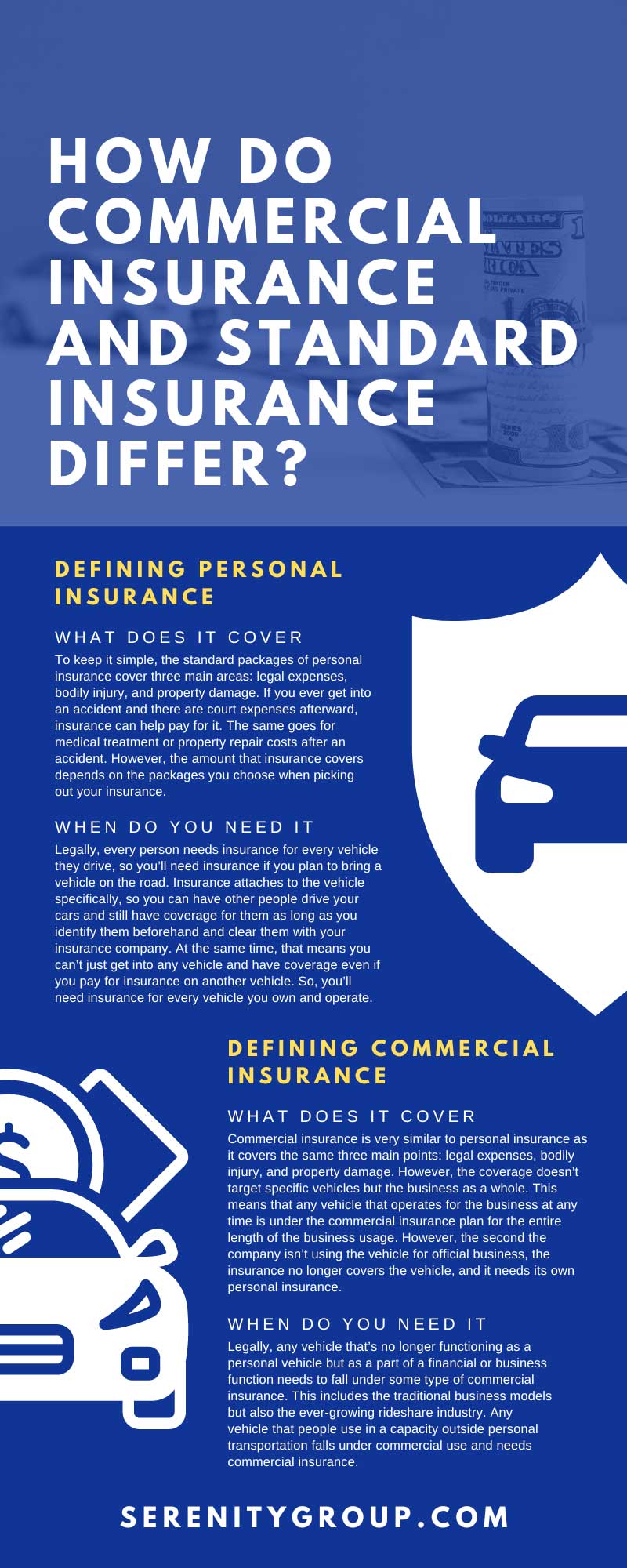How Do Commercial Insurance and Standard Insurance Differ?

Vehicular insurance isn’t just a good idea; it’s necessary for every driver and vehicle on the road. However, there are many different types of insurance, so it’s crucial that you get the right one for your needs. Otherwise, you may run into legal issues and a lack of coverage if you ever need to use your insurance. One of the major mistakes people make is choosing the wrong option between standard and commercial insurance. Here’s a breakdown of the differences between these two common options.
Defining Personal Insurance
First, you should know that personal/standard insurance is the primary method to get insurance for an individual. While there are many types of personal insurance, they all aim to cover a singular person in the case of an accident. Also, the insurance is on the car and not the person, so you’ll need personal insurance for every vehicle you own to operate it on the streets.
What Does It Cover
To keep it simple, the standard packages of personal insurance cover three main areas: legal expenses, bodily injury, and property damage. If you ever get into an accident and there are court expenses afterward, insurance can help pay for it. The same goes for medical treatment or property repair costs after an accident. However, the amount that insurance covers depends on the packages you choose when picking out your insurance.
When Do You Need It
Legally, every person needs insurance for every vehicle they drive, so you’ll need insurance if you plan to bring a vehicle on the road. Insurance attaches to the vehicle specifically, so you can have other people drive your cars and still have coverage for them as long as you identify them beforehand and clear them with your insurance company. At the same time, that means you can’t just get into any vehicle and have coverage even if you pay for insurance on another vehicle. So, you’ll need insurance for every vehicle you own and operate.
Defining Commercial Insurance
Commercial insurance is similar in purpose but functions very differently from standard personal insurance. Commercial vehicle insurance plans are specifically for businesses that utilize vehicles for work purposes and help cover the costs of accidents that occur to these vehicles while on the job. It’s important to note that this insurance only applies to commercial vehicles and not the personal vehicles of individuals, even if the person is a part of a company or business.
What Is a Commercial Vehicle
To understand commercial insurance, you must understand what qualifies as a commercial vehicle. Simply put, it’s any vehicle that participates in the operation of a business in any official capacity. Whether it’s towing items or transporting people to a place of work, any vehicle that operates for a business is a commercial vehicle. It’s possible for a vehicle to be a commercial vehicle as it operates for a business and then lose that status if it serves other functions outside the company’s operation. This is very common for small businesses as people use their own personal vehicles to complete company tasks and then return to utilizing them for their own needs.
What Does It Cover
Commercial insurance is very similar to personal insurance as it covers the same three main points: legal expenses, bodily injury, and property damage. However, the coverage doesn’t target specific vehicles but the business as a whole. This means that any vehicle that operates for the business at any time is under the commercial insurance plan for the entire length of the business usage. However, the second the company isn’t using the vehicle for official business, the insurance no longer covers the vehicle, and it needs its own personal insurance.
When Do You Need It
Legally, any vehicle that’s no longer functioning as a personal vehicle but as a part of a financial or business function needs to fall under some type of commercial insurance. This includes the traditional business models but also the ever-growing rideshare industry. Any vehicle that people use in a capacity outside personal transportation falls under commercial use and needs commercial insurance.
The Differences
Now that you understand the major points of commercial and standard insurance, we can delve deeper into the main differences between the two types of insurance. It’s important to understand these points as they’ll help inform decisions and help you stay inside the law as you use your vehicles for your business or your personal life.
Legal Requirements
Both businesses and people need insurance if they want to own and operate a vehicle of any type. You need personal insurance if you use a vehicle for personal reasons outside the operation of a company, such as personal transportation. Every company needs commercial insurance for legal reasons if it utilizes a vehicle in its operation. Even if it’s something small, any official usage of a vehicle for the benefit of a company requires commercial insurance.
Coverage Amount
Another main difference between these types of insurance is the coverage they offer. Commercial insurance typically covers a lot more, such as various vehicle types and legal issues that regular insurance doesn’t cover. Additionally, commercial insurance usually covers a considerable amount of money, paying for a lot more than comparable packages you’ll find for personal insurance.
Insurance Costs
While they offer a lot more coverage, commercial insurances cost more when it comes to premiums. This additional cost has many benefits, as you get better coverage and can cover multiple vehicles with one insurance package. However, it’s essential to recognize these higher insurance costs when using vehicles for your workplace.
This is everything you need to know about the two popular insurance types that most people regularly interact with. While there are other types of insurance, such as Hired and Non-Owned Auto Insurance (HNOA), that can benefit both individuals and businesses, these are the types that most people will need to understand for their own vehicular use and benefit.


Recent Comments